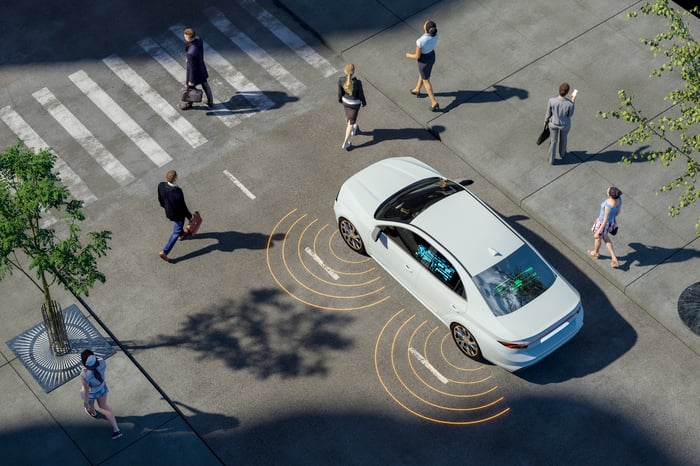In 1901, United States Steel became the world's first $1 billion company. But by 1955, vehicle manufacturing was the largest creator of value, with General Motors beating every other company in the world to a $10 billion market capitalization.
There was another changing of the guard in 1995, when industrial conglomerate General Electric became the first-ever $100 billion company. It offered everything from financial services to household appliances.
The technology sector reigns supreme today. In 2018, Apple (NASDAQ: AAPL) was the first to amass $1 trillion in value, and it has since been joined by Microsoft (NASDAQ: MSFT), Amazon (NASDAQ: AMZN), and Google parent Alphabet (NASDAQ: GOOGL)(NASDAQ: GOOG).
As you can tell, the $1 trillion club is very exclusive, and some companies are currently closer to joining than others. I'm going to reveal one that seems like a long shot, but it has a growing number of opportunities that could catapult it into those ranks.
Uber Technologies (UBER -0.38%) is worth just $79 billion today, so its stock will deliver a 1,116% return for investors if it grows to become a $1 trillion giant. Here's why I think it will.

Image source: Getty Images.
Here's where Uber stands today
Uber operates in three segments: mobility (ride-hailing), food delivery, and commercial freight. It serves more than 130 million customers on its platform each month. In the first quarter of 2023 alone, they booked a whopping 2.1 billion trips across mobility and food delivery.
Uber is the undisputed global leader in ride-sharing, which is the largest driver of the company's revenue. And now it's using that expertise to build the world's largest logistics network as well, through its Uber Freight platform.
It's having some early success, with over $17 billion in freight under management from 200,000 customers so far. That's a drop in the bucket compared to its opportunity, though, which totals $884 billion in the U.S. trucking sector alone.
On the whole, Uber's business is doing great right now!
But Uber is about to enter a new multitrillion-dollar industry
Wall Street firm Ark Investment Management, which is led by popular technology investor Cathie Wood, thinks the future of ride-hailing is the driverless vehicle. It believes fully autonomous-driving vehicles will dominate the industry, and Ark Invest sees Tesla (TSLA -1.11%) delivering its first robo-taxi as soon as this year.
But Uber might already have the upper hand. It abandoned its in-house autonomous-driving segment in 2020 and partnered with a company called Motional in 2022 on a 10-year deal instead. Motional is a joint venture between South Korean automaker Hyundai (HYMTF -1.85%) and mobility technology company Aptiv (APTV 1.54%), and together they have built an advanced self-driving vehicle.
It has already achieved Level 4 capabilities, which means it can navigate and drive without any human intervention whatsoever.
Since Uber already has over 130 million monthly active users in its ecosystem, its transition to autonomous ride-sharing will be seamless. Competitors like Tesla, on the other hand, need to build their own software applications so customers can call a ride, and it could take years to acquire enough users to dent Uber's dominance.
Ark believes autonomous ride-hailing companies will generate $4 trillion in annual revenue as soon as 2027, creating $14 trillion in enterprise value in the process. It looks like Uber is in the driver's seat already.
Here is Uber's (mathematical) path to a $1 trillion valuation
Despite Uber's historical success and its potentially lucrative future opportunities, investors aren't giving its stock much credit. Based on the company's trailing-12-month revenue of $33.8 billion and its current market cap of $79 billion, the stock trades at a price-to-sales (P/S) ratio of just 2.3.
That's far below its peak of 8, which it achieved during the tech boom in 2020. For the sake of this thought experiment, let's assume the stock trades at an average P/S of 4 over the long term, which means it will have to generate $250 billion in annual revenue to justify a $1 trillion valuation.
Uber could get there by the year 2033 if it can grow its revenue by at least 22.1% annually between now and then. It's not out of the question considering the company has grown its revenue by 32% over the last five years despite a pandemic and a weak economy standing in the way.
Don't forget, Ark Invest believes companies in autonomous ride-hailing could generate $4 trillion in revenue as soon as 2027, which means Uber only has to capture 6.2% of that market to achieve $250 billion in that one segment alone! Since it already has a 37% global market share in ride-sharing overall, it should be a piece of cake.
Uber has a real shot at joining Apple, Microsoft, Amazon, and Alphabet in the $1 trillion club over the long run, and if it does, investors who buy the stock today stand to earn a whopping 1,116% return.





